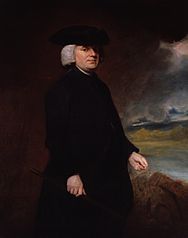William Paley
| William Paley | |
|---|---|

William Paley (1743–1805)
|
|
| Born | July 1743 Peterborough, England |
| Died |
25 May 1805 (aged 61) Bishopwearmouth, England |
| Residence | England |
| Nationality | Irish - English |
| Fields | Natural theology |
| Institutions | Giggleswick Grammar School, Christ's College, Cambridge, Giggleswick Parish, Carlisle Cathedral, Lincoln Cathedral, Durham Cathedral |
| Alma mater | Christ's College, Cambridge |
| Known for | Contributions to moral philosophy, political philosophy, ethics and philosophy of religion |
| Notable awards | Members' Prize, Cambridge, 1765 |
William Paley (July 1743 – 25 May 1805) was an English clergyman, Christian apologist, philosopher, and utilitarian. He is best known for his natural theology exposition of the teleological argument for the existence of God in his work Natural Theology or Evidences of the Existence and Attributes of the Deity, which made use of the watchmaker analogy.
Paley was born in Peterborough, England, and was educated at Giggleswick School, of which his father was headmaster, and at Christ's College, Cambridge. He graduated in 1763 as senior wrangler, became fellow in 1766, and in 1768 tutor of his college. He lectured on Samuel Clarke, Joseph Butler and John Locke in his systematic course on moral philosophy, which subsequently formed the basis of his Principles of Moral and Political Philosophy; and on the New Testament, his own copy of which is in the British Library. The subscription controversy was then agitating the university, and Paley pushed an anonymous defence of a pamphlet in which the Master of Peterhouse and Bishop of Carlisle Edmund Law had advocated the retrenchment and simplification of the Thirty-nine Articles; he did not, however, sign the petition (called the "Feathers Tavern" petition, from the place where it was agreed) for a relaxation of the terms of subscription. He was also a strong supporter of the American colonies during the revolutionary war, partly because he thought it would lead to the destruction of slavery. He studied philosophy.
...
Wikipedia
